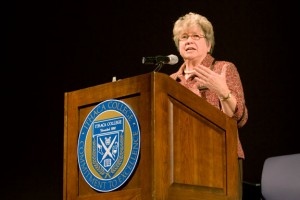Ithaca College hosted a forum on hydraulic fracturing, or fracking, Nov. 3 in Emerson Suites to break down its environmental, economic and political impacts.
The panel featured seven individual presentations representing different sides to the fracking debate and included a question and answer session. It was moderated by Binghamton Public Radio and Television host Crystal Sarakas.

The forum, which many community members and a handful of students attended, was hosted by the college’s School of Business, the Commit to Change program and Sustainability at Ithaca.
Fracking is a controversial procedure that oil and gas companies use to drill for methane gas. To siphon the natural gas from underground rock formations, drill workers inject sand, water and chemicals into the rock formation, opening the pre-existing rock fractures. Ithaca rests on the Marcellus Shale, which is a subterranean rock formation that contains largely untapped sources of natural gas that fracking would access.
Marian Brown, special assistant to the provost for sustainability, said many local fracking forums have been advocacy forums, so as an educational institution, the college decided to host a forum in an attempt to present both sides of the issue.
“We really wanted to create some dialogue,” she said. “We recognize this is an incredibly complex issue, and there are a lot of aspects to it.”
Mary Ellen Zuckerman, dean of the college’s School of Business, introduced the speakers.
Tony Ingraffea, professor of engineering at Cornell University, spoke about the environmental effects of fracking. Ingraffea said the chances of an environmental disaster are too high to pursue fracking in the local area.
“We would have to change the culture of the industry such that … your safety, your health and your environment are their number one concern,” he said. “I don’t think that will ever happen.”
John Holko, president of Lenape Resources and a representative for the Independent Oil and Gas Association of New York, argued fracking would create employment opportunities. He said fracking would create jobs directly in drilling and indirectly in local restaurants,
hotels, retail stores and other local businesses that would benefit from more regional workers with income to spend.
“This is a broad-based employment,” he said. “This isn’t just one little thing or two little things. This is something that we can build an economy on.”
Jannette Barth, president of J.M. Barth & Associates economic consulting firm, said studies focusing on the positive economic impacts of fracking are usually one-sided. For example, Barth said the Supplemental Generic Environmental Impact Statement on gas drilling released in 1988 is outdated and shows signs of bias.
Helen Slottje, a public interest attorney with the Community Environmental Defense Council, Inc., a nonprofit firm supporting landowners, said there needs to be an in-depth and unbiased investigation of the effects of fracking before it is used locally.
“You can’t turn the switch off on this,” she said. “This is a huge investment and an entirely different way of life.”
State Assemblywoman Barbara Lifton, who represents Tompkins County, concluded the evening’s presentations. She said the state is at a “political tipping point” in the search for alternative sources of energy.
“We have to make a political decision now,” she said. “People around the country, people around the world are looking to New York to lead.”
Sophomore Max Grigri, an environmental science major, said he attended the forum out of concern about the negative impacts fracking could have on the local environment.
“From what I’ve heard, I’m really concerned with what could happen to the land that I enjoy very frequently,” he said. “I’m pretty sure this [forum] just further proves my thoughts on the issue.”
To see what documentarian Josh Fox, who visited the college Nov. 2 and was sponsored by the Park Center for Independent Media, has to say about fracking and his award-winning documentary “Gasland” visit http://archive.theithacan.org/5135.







